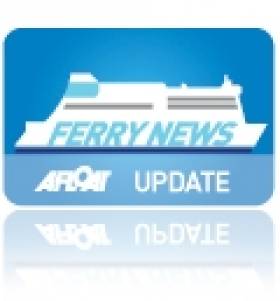Displaying items by tag: Sailings Resume Service
#FerryResolved – Irish Ferries ro-pax Epsilon re-entered service today, following technical issues that started on Friday, leading to cancellation of the weekend Dublin-Cherbourg round trip and those to Holyhead, where today's 14.15hrs sailing departed from the capital to Wales, writes Jehan Ashmore.
As previously reported on Afloat.ie, all effected passengers on the central corridor route were accommodated on the ferry company's High Speed Craft, HSC Jonathan Swift in addition to sailings served by flagship cruiseferry, Ulysses.
During her absence on the routes to Anglesey and Normandy, Epsilon had shifted berths from the Dublin Port ferry terminal to the Deepwater Quay facing opposite, and more recently she had occupied a berth within Alexandra Basin, before repairs were resolved.
As previously reported on Afloat.ie, the parent company of Irish Ferries, the Irish Continental Group (ICG) released first quarter financial figures as part of the interim management statement.
In the statement's report, in terms of the ferries division, volumes of Year-to-date (17 May 2014) were as follows and with changes in performance as outlined below within brackets.
Passengers: 441,100 (0%)
Cars: 95,000 (+5%)
RoRo Freight: 87,900 (+18%)
During the period Irish Ferries inaugurated a weekly Dublin-Cherbourg service, operated at weekends by the chartered Epsilon. The Italian flagged Visetini built ro-pax also provides an additional 8 round trips (except Mondays) on the Dublin-Holyhead route.
As a result the contribution of Epsilon operated sailings combined to the overall route network increase by 17%.The other routes are Rosslare-Pembroke Dock, Rosslare-Cherbourg and as recently reported the reopened Rosslare-Roscoff seasonal-only service that began the 2014 season to the Breton port.
The financial results for the last quarter of this year reflected additional costs of operating the Epsilon during the launch phase period on both her sailings serving Holyhead and Cherbourg.
According to Irish Ferries, in the 20 weeks up to last Saturday, they carried 95,000 cars, an increase of 5% on 2013. While car passenger numbers were up, in line with the car volumes, total passenger volumes were in line with the previous year at 441,100 due to a fall in 'foot' passenger carryings.
As regards Roll-on Roll-off (Ro/Ro) freight sector, Irish Ferries carried 87,900 units in this market, an increase of 18% compared with the same period for last year and is a reflected from the introduction of Epsilon's freight capacity and in a growing freight market.
For more information on other sectors of ICG operations, the statement as linked before can also be read in full HERE.





























































